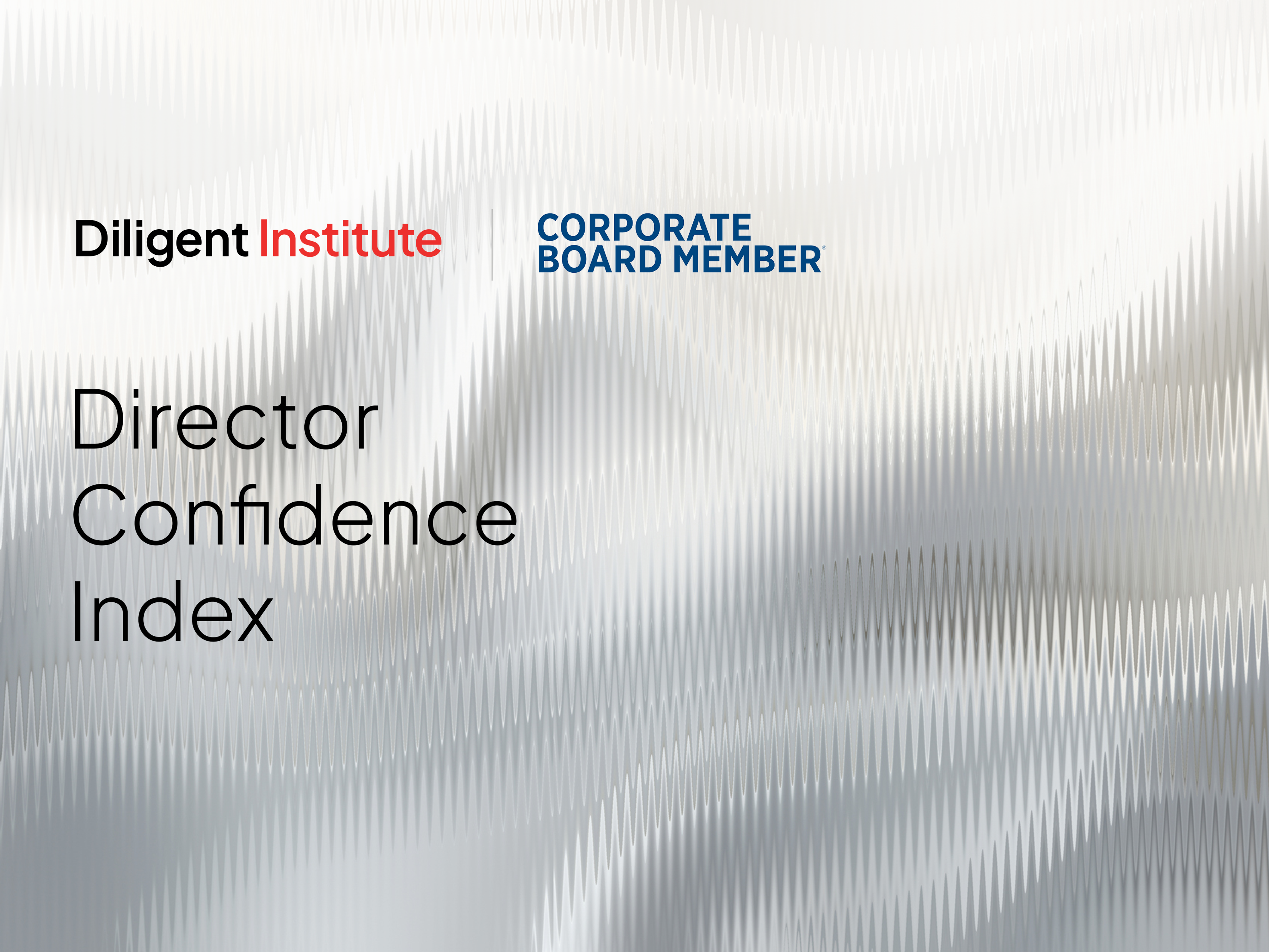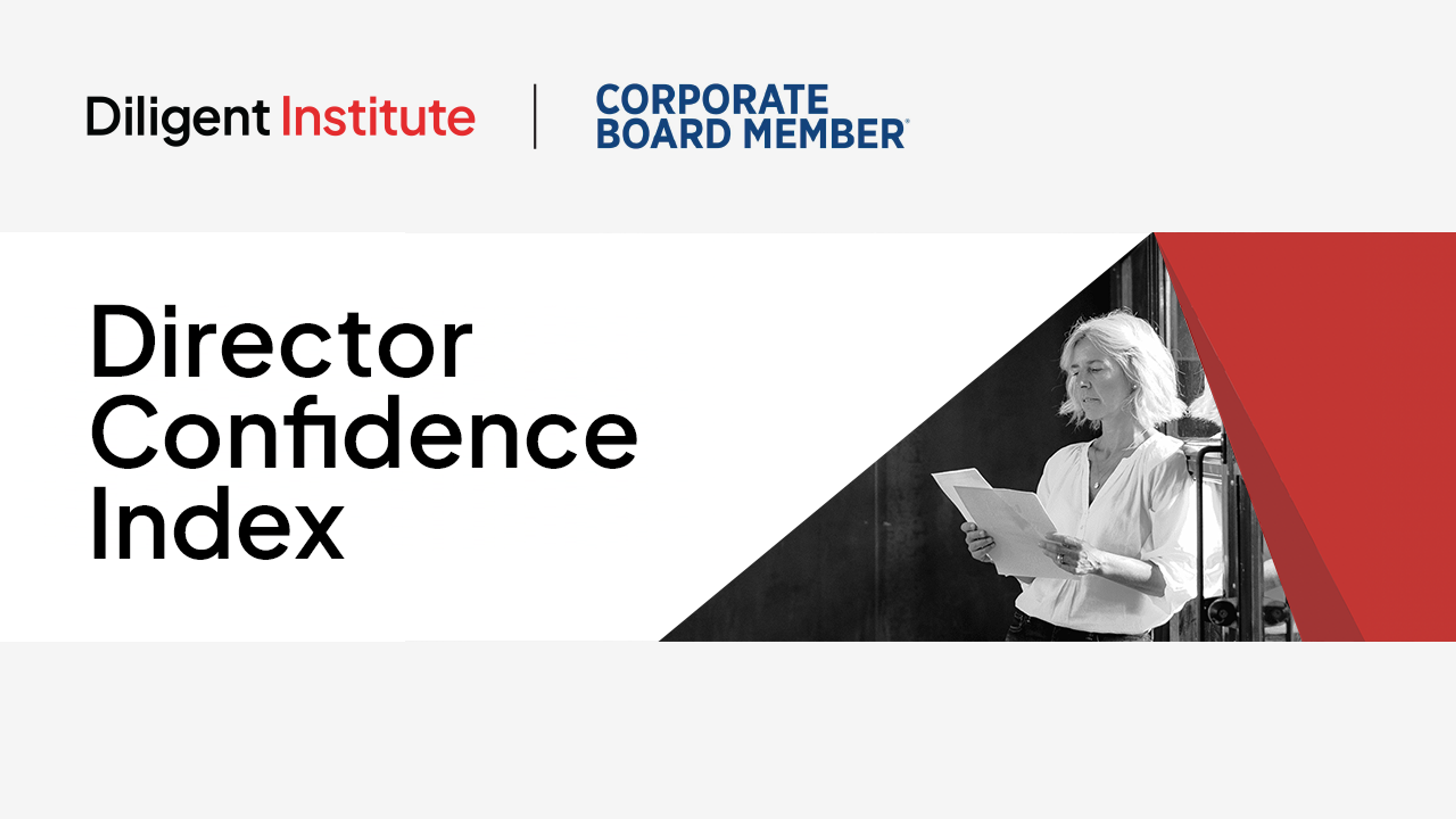What keeps GCs up at night?

In an environment shaped by uncertainty, growing recession fears and trade upheavals, the majority of directors and general counsel are holding firm to their growth agenda for now despite ongoing volatility.
A survey of 165 general counsel and corporate directors at U.S. public companies conducted in March by Corporate Board Member and Diligent Institute finds two-thirds still prioritizing growth initiatives this year—and 9 percent of them say they are doubling down on growth thanks to new opportunities in the market.
However, 32 percent say their company has pivoted to a wait-and-see approach. The wait is likely to last until there is more clarity on the economic front and what all the actions taken today will mean for business, but most of those polled say they expect the current volatility to have faded by the end of the year—and for many, this means companies must maintain their financial strength to seize emerging opportunities.
“There is a lot of uncertainty at this time, but I believe it will pass in the next 9 months,” said one of the directors whose company is staying the course on capturing growth this year.
“The current trade uncertainty will temporarily slow the U.S. economy in 2025, while 2026 will likely deliver more growth and profits,” echoed another.
But all that could change. The great majority of those polled say a sharp economic downturn would carry a “significant” to “detrimental” blow to their business.
“I have invested and sat on board through the internet bubble, the great recession and Covid. This is the most concerned I've ever been about our government's potentially negative impact on our economy in my entire career,” said one of the respondents.

To mitigate the risk, those who have been through severe financial and economic crises in the past say it is crucial to maintain focus on what management can control while making decisions for the longer term, “not next week,” said the former CEO of an American multinational foodservice company who now serves on the boards of global public companies.
And as important, don’t overcorrect, echoed other seasoned respondents. “Play the long game and stick to your core advantages. Don’t get frenzied day to day,” said one respondent who has led public companies through the past 20+ years.
But the economy isn’t the only risk keeping GCs and board members up at night. There are other events, according to the survey data, that can trump a severe recession when it comes to the repercussions on the company.
For general counsel, who view the current risk environment as “moderately high,” rating it 6.8 on a 10-point scale where 1 is a “negligible risk level” and 10 is a “significant risk level,” the most impactful event to their company would be a major cyber breach, ahead of a sharp economic downturn.
For board members, a cyber attack also outweighs a large economic event, but the number one risk according to those polled is the sudden departure of the CEO or other mission-critical individual.

Board-GC alignment
The survey data demonstrates alignment on top risks between GCs and boards, despite the few points differentials between the main items on the list. Still, the data also reveals a potential opportunity for better board-GC communication on those risks.
For instance, only a third of board members surveyed said their GC provides them with extensive or in-depth support on matters of cybersecurity. And more than a quarter (28 percent) said the support from their GC was minimal to non-existent.

The survey found another area where directors may welcome greater input from their GC: Sixty percent of directors said their GC provides minimal to no support to the board in its oversight of AI.

And one third of directors said their GC is not involved or only minimally involved in the board’s enterprise management risk (ERM) discussions.

The area of enterprise risk management is particularly interesting in this optic because in a Director Confidence Index poll last summer, directors said they see room for improvement when it comes to their board’s oversight of ERM. Forty-five percent of directors indicated they would like better benchmarking data, 42 percent wanted to talk about ERM more frequently, and 23 percent wanted to improve communication with management around ERM.
“Directors continue to view ERM oversight as a pain point, and they’re seeking better data and insights to combat this,” said Dottie Schindlinger, executive director of the Diligent Institute. “The role of the GC can be pivotal in refining the board's oversight of ERM, by providing that comprehensive benchmarking data and using AI tools to create a risk heat map, facilitating more discussions at the board level and enhancing communication with the rest of the management team.”
The survey found several areas where directors say their GC is participating actively in boardroom discussion. On regulatory compliance, for instance: 76 percent of board members say their GC provides extensive support. And 54 percent said the same of the company’s crisis response plan.


Zebra Technologies Board Chair Michael Smith says he’s surprised by these findings because in his experience, the GC “sits through virtually all board meeting deliberations except executive sessions,” he said in an interview with Corporate Board Member.
“If there's any place where risk assessment and mitigation plans come together, it's usually under the GC, and certainly it's a core responsibility of the entire board of directors, so I would say it is surprising—and concerning,” he said.
Jan Babiak, who serves as audit committee chair at Walgreens Boots Alliance and Bank of Montreal and has served on several other public company boards globally, says the data may highlight an important operational distinction most likely based on company size.
At companies where she has been a corporate director, the GC may or may not attend the full board meeting—unless the GC is also the corporate secretary. The GC, appropriately, isn’t usually the “main interface” during cyber and many other risk-related deliberations with the full board. “A lot of board members don’t realize the levels of involvement of the GC because the GC isn’t necessarily talking with the full board about [some of these issues],” she said. Instead, a member of the senior management team—for instance, the CISO in the case of cybersecurity—is more likely to be sitting in on these conversations with the board or relevant committee, depending on the issue being discussed.
But, she says, that doesn’t mean the GC isn’t providing extensive support or leadership behind the scenes. “I would be very surprised if a competent GC hadn’t been consulted and wasn’t on top of this. In fact, it would worry me if the GC was the one who was fronting [the issue] because that might mean we didn’t have the depth of experience in the organization that we need.”
So, perhaps the disconnect highlighted by the survey findings between directors and general counsel on risk and board support reveals untapped potential for stronger collaboration. As the majority of GCs we polled say they would welcome receiving more education/training on how best to advise the board, this area may provide the first steps to strengthening that all-too-important relationship, as companies continue to face unprecedented disruption to their strategic plan.

Director Confidence Index: March 2025
Boardroom outlook plunges 30% in our Q1 survey of U.S. public company directors amid worries about Washington.

Board members seek ERM benchmarking data
Our June poll of U.S. public company directors, conducted with Corporate Board Member, finds enterprise risk taking up more of the board’s time in the past year.

How general counsels are stepping up as unlikely AI champions
Discover how general counsels are emerging as unexpected leaders in AI adoption, driving innovation, compliance, and strategic decision-making across organizations.